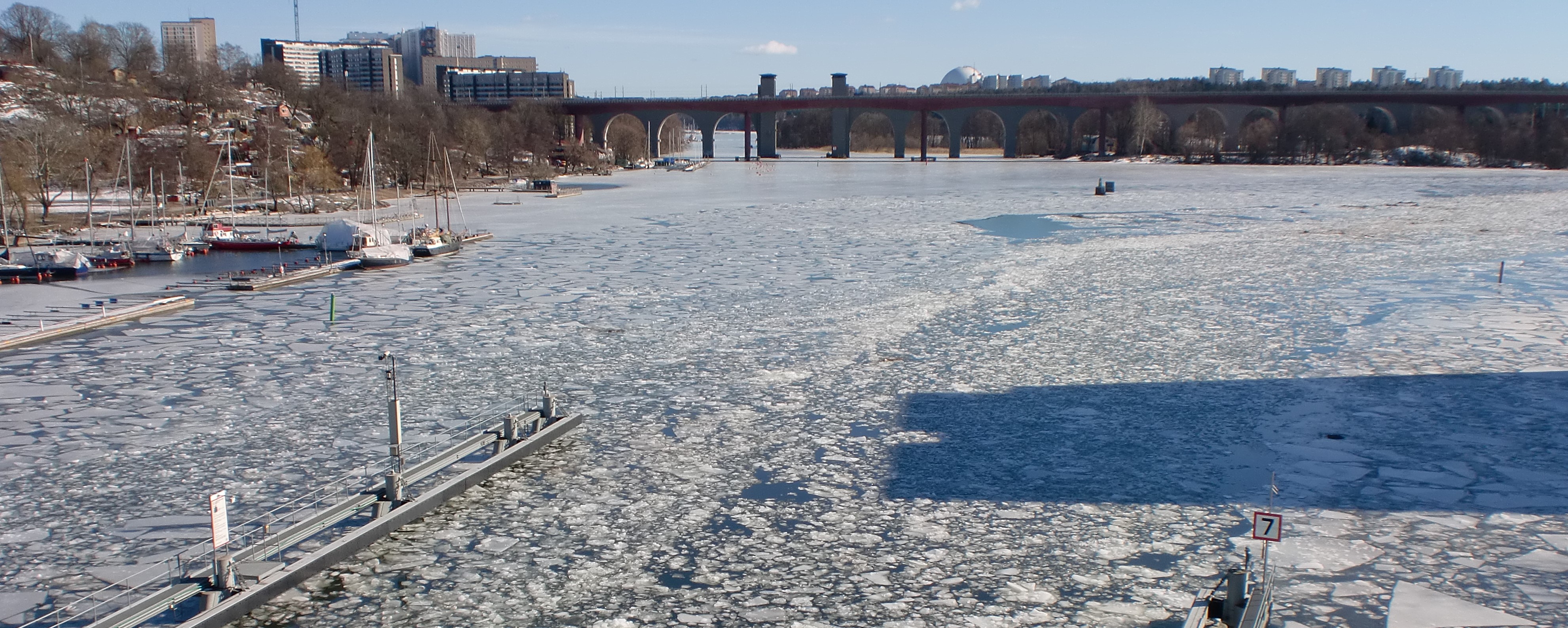- EFFICIENT HULLS ON ICY INLAND WTERWAYS

På svenska längre ner!
The project aims to show and communicate how different materials, material concepts and structural arrangements are more or less suitable in ship hulls in Nordic IWW conditions. This includes formulating design loads for ships operating Nordic Inland waters and in turn the need to define Nordic IWW conditions and the loads relation to vessel speed, size and shape.
Transport policy objectives and a general view of a large capacity potential on the inland water ways (IWW) together with anticipated positive effects for land infrastructure, predicts development of a modern, rational and well-designed waterborne transport system for IWW. In this context one of the most commonly referred obstacles are uncertainties in relation to winter navigation. What is really IWW winter conditions? Which ice loads shall vessels be designed to cope? And what rules are applicable to these vessels?
The project background is prestudies in the Waterway365 project, particularly LightIce [1], and KTH participation in the EU-Interreg project EMMA [2]. Studies supported by the Swedish Maritime Administration, the Swedish Transport Agency and the EU and performed in cooperation with Vattenbussen AB, Hamburg-Harburg Technical University (TUHH) and Avatar Logistics. In the present project, Efficent hulls on icy inland waterways, funded by the Swedish Transport Administration, the cooperation with TUHH is deepened to complementing the KTH strength in lightweiht structures with expertiees in ice mechanics and ice loads.
Results; references to reports and papers at the end of the page!
Projektets syfte är att visa och kommunicera hur olika material, materialkoncept och strukturarrangemang lämpar sig som skrovmaterial till fartyg på nordiska inre vattenvägar. I det inkuderar formulering av design belastningar för nordiska förhållanden vilket underförstått kräver definition av förhållandena och belastningarnas koppling till fartygets fart, storlek och form.
Transportpolitiska mål och en allmän uppfattning om stor kapacitetspotential på vattenvägen och fördelaktig avlastning av landinfrastrukturen talar för utveckling av ett modernt och genomtänkt sjötrasportsystem på de inre vattenvägarna IVV. Ett hinder för utvecklingen är osäkerheter kring vintertrafik. Hur ser vinterförhållandena egentligen ut på de inre vattenvägarna? Vilka is-belastningar måste fartygen dimensioneras för att klara av? Vilka fartygsystem bör man satsa på i ett rationellt IVV-transportsystem? Och vilka regelverk är tillämpbara för dessa fartyg?
Projektets bakgrund är förstudier inom projeket Vattenvägen 365, specialt delstudien LightIce [1], och KTH:s medverkan i EU-Interreg projektet EMMA [2]. Studier som stöttats av Sjöfartsverket och Transportstyrelsen och som genomförts i samarbete med Vattenbussen AB, Hamburg-Harburg Technical University (TUHH) och Avatar Logistics. I det pågående projektet, Effektiva skrov på isiga inre vattenvägar, som finansieras av Trafikverket fördjupas samarbetet med TUHH för att komplettera KTH:s kompetens inom Lättkonstruktioner med expertise inom ismekanik och isbelastningar.
Results/resultat:
- Herrnring H., Kubiczek J .M., Ehlers S., Niclasen N. O. & Burman M. (2017). Experimental investigation of an accidental ice impact on an aluminium high speed craft, conf. proc., 6th Int. Conf. on Marine Structures Marstruct2017, 8-10 May 2017, Lisbon Portugal.
- Zhang M. (2018). Ship Performance Under Ice Condition Evaluation of inland barges for navigation on ice conditions, Report EU-interreg project EMMA. http://project-emma.eu/content/emma-22-iww-navigation-ice-conditions
- Zhang M., Cheemakurthy H., Ehlers S., von Bock und Polach F., Garme K. & Burman M. (2018). Ice pressure prediction based on the probabilistic method for ice-going vessels in inland waterways, Proc. ASME 2018 37th Int. Conf. on Ocean, Offshore and Arctic Engineering, OMAE 2018 June 17-22, Madrid, Spain
- Cheemakurthy H., Zhang M., Ehlers S., von Bock und Polach F., Garme K. & Burman M. (2018). Statistical Estimation of Uncertainties associated with Ship Operations in fresh water ice, accepted for publication in the proc. of int. conf. ISOPE, Sapporo Japan June 2018.
- Zhang M., Cheemakurthy H., Ehlers S., von Bock und Polach F., Garme K & Burman M., (2018). Ice Pressure Prediction Based on the Probabilistic Method for Ice-Going Vessels in Inland Waterways, Journal of Offshore Mechanics and Arctic Engineering-Transactions of The Asme, vol. 141, 2018.
-
Zhang M. (2019). Ice Load Prediction for Design of Ice-Going Ships for Inland Waterways, Licentiate thesis, KTH TRITA-SCI-FOU 2019:58
-
Zhang M., Garme K., Burman M. and Zhou L. (2020). A Numerical Ice Load Prediction Model Based on Ice-Hull Collision Mechanism, Applied Sciences, vol. 10, no. 2, 2020.
-
Sun Q., Zhang M., Zhou L., Garme K. & Burman M. (2022). A machine learning-based method for prediction of ship performance in ice: Part I. ice resistance, Marine Structures, vol. 83, s. 103181-103181, 2022.
-
Zhang M., Sun Q, Garme K., Burman M (2022), Analysis of inland waterway ship performance in ice: Operation Time Window, Ocean Engineering, vol. 263, s. 112409-112409, 2022.
-
Zhang M. (2022). Efficient hull design for ice conditions in inland waterways, Doctoral Thesis, KTH TRITA-SCI-FOU 2022:36